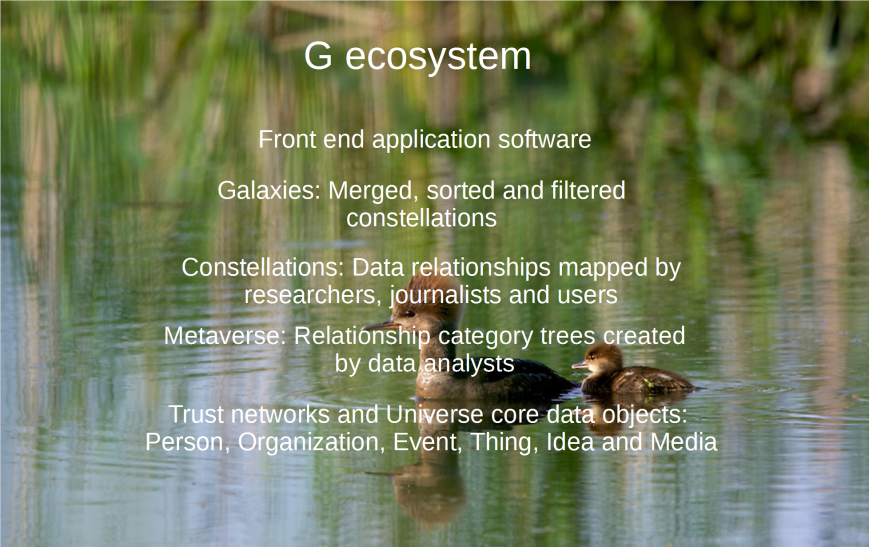
The Universal Database
We have free software. We need free databases.
DonateWhat is G?
G is a free and open data commons. It uses a universal database and trust network to return control of our data to the users who created it while still allowing for mass collaboration. It will allow people to easily change the applications they use to access their data and choose only the functionality they want in an application. It will allow anyone to collaborate without using the same applications. The structure is an ecosystem, anything can be replaced without destroying the whole.
Read More:
What does G do?
With G, we filter out astroturfing and spam using trust networks. Everyone has control of their own information filters. We aren't overwhelmed by celebrity influence because the structure promotes the people contributing research instead. Everyone can choose who they work with but all research is open and linked. We allow diversity of opinion and different viewpoints. We let our own trust networks decide what is important to show us instead of leaving it up to search engines or social media platforms.

What can G be used for?
Journalism
Instead of repetitive news, cut and pasted across all media outlets, G allows news to be added to a permanent knowledge repository. Transient news streams can be replaced with knowledge that builds over time while still allowing the new additions to be highlighted. G encourages deeper research over trivial updates and recognizes the original sources of a story as there is no need for endless duplicate sources. G enables more fluid collaboration between journalists while retaining autonomy and individual recognition for contribution. G allows news to easily be displayed with different contexts.
Whistleblowers
Data can be easily uploaded into source media nodes and relationships mapped to be used as a resource for all researchers and journalists, not just a selected few. Any outside person could create and link different constellations containing other information, making research much faster and more productive. We would have the data in a permanently usable format, in a global commons for us all to build from instead of unusable wall of text articles everywhere and a private databases for selected journalists.
Commerce
Rather than relying on easily manipulated site reviews and trust algorithms, we can rely on our own personal trust networks for filtering. Local or specialized merchants can create constellations to link each other together in a trust network as well, adding another local layer of accountability, local control over industry and the ability to allow regional diversity for local laws or customs. Software applications become simply that, easily replaceable applications which provide some functionality such as paying a taxi driver or buying a product.
Transparent and fluid organization
Organizations can use constellations and galaxies both for transparency and for dynamic reorganization for specific tasks. The benefit to these galaxies is the responsible person can change at the constellation level and the change will be instantly reflected in all associated galaxies. The data in every galaxy can be used in collaborative apps which allow the group to work without outside noise but remain completely transparently to the public.
Direct trade
Direct trade relationships can be established between communities, bypassing the political and corporate control over trade and encouraging public education and engagement over current trade and duty laws. Direct community relationships will allow consumers to see the immediate impact of their trade choices.
Science and research
Instead of a closed circle of academia in which paper citations can be reflections of power and reciprocity instead of knowledge, Idea nodes can be set up around any topic and all contributions heard. Individual readers can use their own trust settings to decide what accreditation they want to see in authors of research.
Governance and law
Principles of a society contained in documents such as constitutions and bills of rights can be listed with the historic or potential consequences of each definition and option. This clarification makes each point far easier for every member of society to understand and agree on and then ensure that all law in that society flows naturally from the root principles. It could also be possible to use accepted principles to choose association, for instance to refuse trade with a corporation that refuses to accept certain environmental practices.